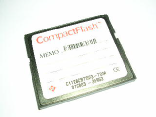

“What is your name? When were you born? What day is it? Where are you? Who is the Prime Minister of Australia?…”
They are the kinds of questions used to test stroke victims and others to check their amount of memory loss. After the staff had gone, one such person said to her relatives, “Don’t they know the answers to those questions?” Well… would you have passed the test? Whether we admit it or not, we all seem to have moments of forgetfulness!
 The picture on the left is the memory card from a digital camera. Modern technology can frustrate us all at times, but – have you ever wished you could just push a few buttons and reformat your brain? or perhaps that you could go down to a shop and buy a little more memory to make up for what you have been losing?
The picture on the left is the memory card from a digital camera. Modern technology can frustrate us all at times, but – have you ever wished you could just push a few buttons and reformat your brain? or perhaps that you could go down to a shop and buy a little more memory to make up for what you have been losing? On the right is the battery from a mobile phone. It is amazing what they build into phones these days. The younger folk are interested in what games can be played on them. You can make sure yours will play a different tune from everyone else’s in a crowd. The very latest offer the ability to take photos and then email them to someone else. What will they think of next? But none of it is of any use without a battery. The battery “died” on my phone the other day and I had to buy a new one. The phone was quite useless without it.
On the right is the battery from a mobile phone. It is amazing what they build into phones these days. The younger folk are interested in what games can be played on them. You can make sure yours will play a different tune from everyone else’s in a crowd. The very latest offer the ability to take photos and then email them to someone else. What will they think of next? But none of it is of any use without a battery. The battery “died” on my phone the other day and I had to buy a new one. The phone was quite useless without it.
Memory – “Now what was I going to say? It’s just slipped my mind!” You may recall that when the Watergate case was before the American courts it was a matter of comment that men who were highly trained to remember details seemed unable (or was it unwilling?) to remember what had happened.
My mother used to talk about her “good forgettery”. But then she had a couple of strokes and was in the Royal Brisbane Hospital. She thought I was her father, talked about how Tom (my Dad) was very concerned about her but hadn’t come to see her yet – he had died about four years before… She had no sense of day or night and began talking to the lady in the next bed at three o’clock in the morning…
Then one day we heard her singing. She used to have a good true singing voice, but she seemed to have lost the ability to stay on pitch. We had difficulty picking out the words. It was an old song we didn’t know at all, but we traced it down to the old Sankey’s hymn book –
What a wonderful Saviour is Jesus, my Jesus!
What a wonderful Saviour is Jesus, my Lord!
She had lost so much memory, but still remembered what was basic to her life.
Memory and power. Both are important to us for a full life. In old age we can lose one or other – or both.
I get the distinct impression that the Christian church is often divided between the memory-people and the power-people. That’s an unhealthy division – the Church needs both memory and power.
Of course, there’s some memory that isn’t as vital as we imagine. It’s always been done this way, someone insists. Truth is that there was probably a time when it wasn’t done at all! One woman insisted that her husband would “turn in his grave” if he knew something or other. Didn’t she believe in heaven?
But some memory is absolutely essential. If the Church starts to forget the revealed Word of God in Scripture and the work of grace through the Son of God, we are in real trouble. Issues of flowers on the communion table, of organs or drums, of choruses or hymns, of prayers written or unwritten… all are somehow irrelevant if our memory gets shaky on the essentials. The Church’s memory-people have a very important point when they are insisting on the essentials.
But the Church needs power-people too. After all, didn’t Jesus make the promise, “you will receive power when the Holy Spirit comes on you; and you will be my witnesses in Jerusalem, and in all Judaea and Samaria, and to the ends of the earth” (Acts 1.8)?
Yes, he did, and we shouldn’t have had to wait for the pentecostal movement to come along and remind us that something was missing. Actually, the modern pentecostal movement began in 1901. That was the hey-day of liberal teaching that viewed the Bible as human teaching rather than divine revelation, that saw Jesus as teacher and example rather than as Saviour and Lord. The Church’s memory had become rather “fuzzy” and worship and fellowship had tended to become ordered but cold. We needed a shake-up.
But power without memory is dangerous too. The lapse of a number of high-profile pentecostal leaders has sounded the warning on that. By itself, power can be a very dangerous thing. Too easily we seek it for its own sake and forget to be Christ’s witnesses – pointing away from ourselves to our Saviour and Lord.
Should the Church make use of technology? My father wrote all his sermons with a fountain pen and used nothing more sophisticated than a stick of chalk when teaching R.E. at school. We can’t avoid the new ways of doing things, but we mustn’t get obsessed with them either. Don’t let “power” overtake memory!
“What a wonderful Saviour is Jesus, my Jesus!” Keep that memory clear! Be open to the promised Spirit power!
© Peter J Blackburn, Link, August 2004